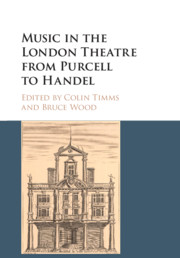Book contents
- Frontmatter
- Contents
- List of Figures
- List of Music Examples
- Notes on Contributors
- Preface
- Introduction
- I FROM PURCELL TO HANDEL
- II HANDEL AND ITALIAN OPERA
- 6 Ombra mai fu: Shades of Greece and Rome in the Librettos for Handel's London Operas
- 7 Handel and the Uses of Antiquity
- 8 From Metastasio's Alessandro to Handel's Poro: A Change of Dramatic Emphasis
- 9 Deidamia as an ‘Heroi–comi–pastoral’ Opera
- III HANDEL AND ENGLISH WORKS IN THE THEATRE
- Bibliography
- Index
7 - Handel and the Uses of Antiquity
from II - HANDEL AND ITALIAN OPERA
Published online by Cambridge University Press: 10 June 2017
- Frontmatter
- Contents
- List of Figures
- List of Music Examples
- Notes on Contributors
- Preface
- Introduction
- I FROM PURCELL TO HANDEL
- II HANDEL AND ITALIAN OPERA
- 6 Ombra mai fu: Shades of Greece and Rome in the Librettos for Handel's London Operas
- 7 Handel and the Uses of Antiquity
- 8 From Metastasio's Alessandro to Handel's Poro: A Change of Dramatic Emphasis
- 9 Deidamia as an ‘Heroi–comi–pastoral’ Opera
- III HANDEL AND ENGLISH WORKS IN THE THEATRE
- Bibliography
- Index
Summary
Euripides’ Alcestis is a strange and cruel story, despite its happy ending. The play's peculiar combination of a domestic catastrophe with other-worldly fantasy has continued to startle and intrigue its audiences. ‘Adult themes’ are treated here like fairy-tale motifs. Alcestis does not seem to have been a widely read drama in Handel's time, and its use for his opera seria Admeto (1727) – to the extent that one may employ the term a ‘use’ – was probably not popularity-driven. Wendy Heller's essay on this work has deepened our understanding of the gender rivalries, the uncanny intimacy and the playing with simulacra that characterise this play in its Italian operatic versions. The Hanoverians, for whom (according to Heller) this seems to have been a key drama, may have had needs answered by such lore, or secret fears stirred by it.
Other stories from the political and domestic history and legend of the ancient Jews, Greeks and Romans are often more tragic and horrible. Parricide, incest, human sacrifice and military slaughter of innocents are frequent themes. The Bacchic lore and the Iphigenia myth, for example, became fundamental plots for the seventeenth- and eighteenth-century musical theatre (respectively), probably not because the particular ancient texts narrating them were popular reading, nor simply because they aroused the canonic reactions of terror and compassion, but because these topics seem to have reflected a persistent cultural concern with barbaric memories. The themes of parricide and human sacrifice, in particular, seem to have evoked shudders in early modern audiences that the theatre could not ignore. Some of these themes are used in Handel's operas and oratorios, although not in the majority.
Why did Handel set certain stories and not others? Who decided, and by what criteria, on the topic of an opera or oratorio in the performative context of London stages? How did choices of plot for the musical theatre relate to the reading repertories of their audiences? None of these questions can be answered here as such, but it may be helpful to explore at least one segment of the theatrical repertory – the raisons d’être, the strategies of presentation and the possible intertextual implications of Handel's operas and oratorios on themes from antiquity.
- Type
- Chapter
- Information
- Music in the London Theatre from Purcell to Handel , pp. 99 - 113Publisher: Cambridge University PressPrint publication year: 2017



